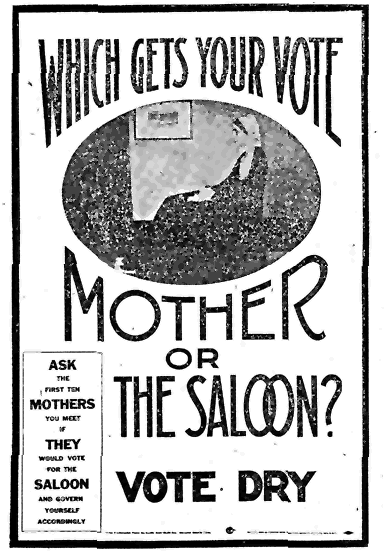
Uxbridge
Historical Centre

restraint

temperance movement begins
The Temperance Movement was led by groups of passionate individuals who had serious concerns over the effects of alcohol consumption. They believed prohibition would be an important step towards creating a better society. During the 1870s, the Temperance Movement was working Canada-wide to shut down liquor and beer outlets and suppliers. Early records reveal that the Sons of Temperance, founded in New York City in 1842, were active in Uxbridge by 1862. This organization lobbied for restrictive legislation concerning alcohol and tried to change the public's attitude and behaviour towards liquor.
The Order of Good Templars, founded in Utica, New York in 1841, made their presence known by circulating a petition through Uxbridge requesting the number of licenses granted for selling intoxicating liquors be reduced. Although economically harmful, several prominent businessmen in Uxbridge were members or allies of the Temperance Movement because of social and religious principles.
legislation
In 1864, Canada's Dunkin Act allowed any municipality to prohibit the retail sale of alcohol by majority vote and by 1878 this developed into the Canada Temperance Act. This act was in full effect in Uxbridge by 1884 but was repealed just three years later.
To stop the sale and misuse of alcohol, revivalists and religious groups, such as the Royal Templars, worked tirelessly to shut down Uxbridge's liquor and beer distributors and bootleggers. The supply of alcohol was scarce and the price was high to compensate the producers and distributors for breaking the law. The stricter prohibition enforcement became, the scarcer alcohol was, and the higher the price went.


Legislation Timeline
1864 - Dunkin Act in the united Province of Canada allowed any country or municipality to prohibit the retail sale of liquor with by majority vote
1870 - Sons of Temperance first recorded in Uxbridge
1875 - The Good Templars circulate a petition through the village requesting the number of licenses to be granted for selling intoxicating liquors be reduced
1877 - A meeting was held at the Uxbridge Town Hall for the purpose of discussing the desirability of passing the Dunkin Bill
1878 - Dunkin Act is extended to the whole Dominion under the Canada Temperance Act, or "Scott Act"
1884 - Scott Temperance Act appealed to Uxbridge
1885 - Women's Christian Temperance Union have their first meeting
1887 - Scott Temperance Act repealed in Uxbridge
1888 - Temperance revivalists closed a successful week of revival under the auspices of the Uxbridge order, Royal Templars
1917 - Uxbridge votes in favour of prohibition
1952 - Uxbridge votes 585 no to 525 for legal liquor control / distribution
1957 - The third Uxbridge liquor vote in Uxbridge in 41 years. 87 percent voter turnout who turned down a beer outlet and liquor store in the town
1965 - An Ontario Government Liquor store was approved and let into Uxbridge (LCBO)
1973 - Brewers' Retail Store opened on Main Street (Beer Store)
1974 - Uxbridge officially votes "wet", prohibition concludes
Despite strong temperance action in Uxbridge, it was reported that in 1896 that 3,520 gallons of beer and 155 cases of ale were stored within the town's hotels to help satisfy customers during the winter months.
Christianity & temperance
In the 19th century, joining an official fraternal or religious organization as the most common way that people could participate in the Temperance Movement. Some religious temperance groups believed that men who drank alcohol were prone to the worst evils, becoming religiously lost, irresponsible, and cruel abusers of wives and children.


Fraternal temperance groups were also serious about the evils of alcohol and their Christian duty. These groups attempted to make their meetings entertaining by holding outings, picnics, teas, debates, and even spelling bees.
When joining a fraternal temperance group, the most formal and important part of the initiation process was the taking of a public pledge to abstain from alcohol. This pledge varied slightly over time and between temperance organizations, but remained consistent at its core.
uxbridge votes
Many of the hotels and stores selling liquor in Uxbridge began to close in the 1890s and early 1900s as a result of the local opposition to alcohol. In the years after the Canada Temperance Act was repealed in Uxbridge, the townspeople began to notice an increasing number of alcohol related disturbances.
In 1915, a bylaw was passed to stop the sale of alcohol in Uxbridge and in 1917, Uxbridge residents voted for the town to become 'dry', thereby prohibiting the sale and consumption of alcohol within the town limits. This municipal prohibition law stayed in effect for the next 57 years. The town voted to stay alcohol free again in 1953, 1957, and 1963.


women, temperance, & faith
The Women's Christian Temperance Union (WCTU) was the largest non-denominational women's organization in 19th century Canada. They believed that alcohol abuse was the cause of unemployment, disease, prostitution, poverty, violence against women and children, and immorality.
The WCTU campaigned for the prohibition of all alcohol and they placed a great emphasis on social action and the importance of total abstinence. Involvement in temperance work also allowed women to create a new platform for themselves and played an important part in the first-wave of the feminist movement.



Alma Gould, circa October 27, 1854.
Courtesy of the Uxbridge Historical Centre, ID: P241.2
Alma Gould, a Quaker and daughter of prominent Uxbridge businessman Joseph Gould, quickly became associated with the fight for local and total prohibition in Uxbridge.
At the Canada Yearly Meeting of 1887 (an annual meeting of Quakers), Alma was one of eleven persons appointed to the Temperance Committee. Quakers in Canada worked with the government in favour of prohibition, advocating against the use of alcohol and tobacco. They also proposed that the Ministry of Education should educate youth on the evils of intemperance.